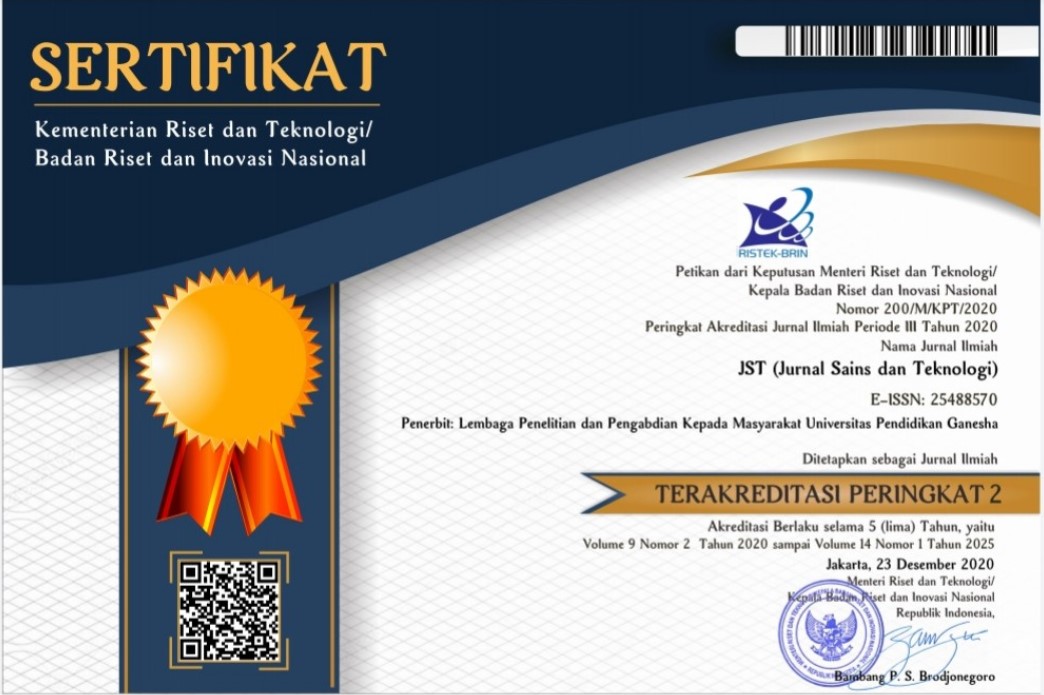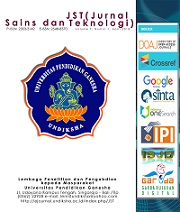PERANCANGAN BEHAVIOR-BASED ROBOT DENGAN ALGORITMA FUZZY Q-LEARNING (FQL) PADA SISTEM NAVIGASI ROBOT OTONOM BERODA DALAM MEDAN YANG TIDAK TERSTRUKTUR
DOI:
https://doi.org/10.23887/jstundiksha.v2i1.1419Abstract
Pada banyak aplikasi robotika, seperti sistem navigasi robot mandiri atau robot otonom yang bergerak dengan mandiri pada lingkungan tidak terstruktur, sangat sulit atau tidak mungkin memperoleh model matematik yang tepat dari interaksi robot dengan lingkungannya. Untuk itu diperlukan pendekatan sistem kendali robot yang dikenal dengan sistem kendali Behavior-Based Robot (BBR). Pada pendekatan ini, sistem diuraikan menjadi beberapa modul yang masing-masingnya bertanggung jawab untuk melakukan satu perilaku (behavior). Salah satu metode pembelajaran yang paling cocok untuk aplikasi robot adalah Reinforcement Learning (RL), dengan jenis algoritma Q-learning. Kombinasi Q-learning dengan Fuzzy Inference System (FIS) dikenal dengan nama Fuzzy Q-Learning (FQL). Berdasarkan percobaan yang dilakukan sebanyak 3 kali pada robot beroda dapat disimpulkan bahwa waktu rata-rata robot kembali ke Homebase yaitu 1 menit 10 detik. Sedangkan waktu rata-rata robot dalam mematikan api lilin adalah 2 detik. Sehingga dapat dikatakan robot yang dibuat mempunyai kinerja yang cukup baik.Downloads
Published
2013-04-01
How to Cite
Santo Gitakarma, M. (2013). PERANCANGAN BEHAVIOR-BASED ROBOT DENGAN ALGORITMA FUZZY Q-LEARNING (FQL) PADA SISTEM NAVIGASI ROBOT OTONOM BERODA DALAM MEDAN YANG TIDAK TERSTRUKTUR. JST (Jurnal Sains Dan Teknologi), 2(1). https://doi.org/10.23887/jstundiksha.v2i1.1419
Issue
Section
Articles
License
Authors who publish with the Jurnal Sains dan Teknologi (JST) agree to the following terms:
- Authors retain copyright and grant the journal the right of first publication with the work simultaneously licensed under a Creative Commons Attribution License (CC BY-SA 4.0) that allows others to share the work with an acknowledgment of the work's authorship and initial publication in this journal.
- Authors are able to enter into separate, additional contractual arrangements for the non-exclusive distribution of the journal's published version of the work (e.g., post it to an institutional repository or publish it in a book), with an acknowledgment of its initial publication in this journal.
- Authors are permitted and encouraged to post their work online (e.g., in institutional repositories or on their website) prior to and during the submission process, as it can lead to productive exchanges, as well as earlier and greater citation of published work. (See The Effect of Open Access)
















